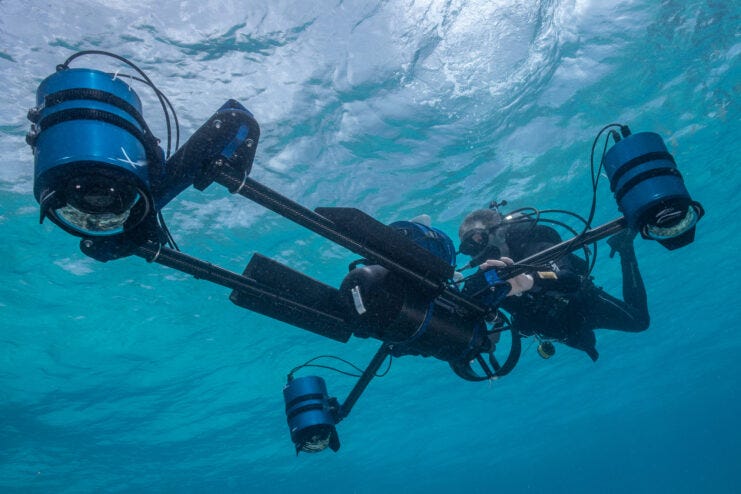Think.
Since I am on my way to Guam as a part of a National Park Service diving expedition to search for WWII artifacts, I thought it was a good time for a quick dive physics lesson (we’ll get back to rucking soon).
We live at the bottom of an ocean of air. At sea level, that ocean weighs down on all of us at the rate of 14.7 pounds per square inch (PSI). This is referred to as one atmosphere of pressure or 1 ATA.
To increase the pressure exerted on us to 2 ATA (or 29.4 PSI) we must travel to a depth of 33 FSW (feet of seawater). We continue to add 1 atmosphere of pressure for each successive 33 FSW.
Assuming we are SCUBA diving and breathing compressed atmospheric air, each lungful contains roughly 79% nitrogen and 21% oxygen (and some minuscule parts of other random gasses).
A funny thing happens when we reach a depth of around 99 Feet or 4 ATA. We become susceptible to a diving malady known as Nitrogen Narcosis or The Rapture of the Deep.
Narcosis comes from the Greek word νάρκωσις (narkōsis), "the act of making numb." It shares its root with the word ‘narcotic’.
The effects of narcosis range from a mild feeling of euphoria to hysteria, stupefaction, hallucinations, a manic state, and potentially, death.
This is sometimes referred to as the Martini effect, with every 15 meters of depth equaling the impact of slamming another martini.
I’ve heard stories of divers becoming combative or trying to share their regulator with fish.
There are two gas laws that explain our susceptibility to nitrogen narcosis.
Dalton’s Law of partial pressure states that,
‘The total pressure exerted by a mixture of gases is equal to the sum of the partial pressures of the individual gases with each gas acting as if it alone were present and occupied the total volume.”
In plain language, this means that as we descend, the component pressures of each gas (oxygen and nitrogen) increase because the total pressure increases. At increased partial pressures, both nitrogen and oxygen can have adverse effects. But with SCUBA, nitrogen will become a problem long before oxygen will.
As Dalton’s law begins taking effect, the increased partial pressure causes the nitrogen to become more soluble, and dissolve in the bloodstream and perfuse into the body’s tissue. This is a product of Henry’s law, which states that:
“The amount of gas that is dissolved in a liquid is directly proportional to the partial pressure of that gas above the liquid when the temperature is kept constant.”
The nitrogen dissolved in the bloodstream is what causes ‘the bends’ if the diver ascends too rapidly. But that is a story for another day.
I can hear some of you saying, “Thanks for the science lesson bro, but what does this have to do with me?”
Whether you dive or not, we can all become susceptible to the euphoric feeling that comes with being too deep in a problem, perspective, or point of view.
Whether due to nitrogen narcosis, martinis, or an entrenched perspective, it can be challenging to recognize the signs and symptoms when we slip beyond a point that is healthy or helpful.
When we get too close to a problem, it becomes all we can see.
Just as the diver simply needs to ascend a bit to shake off the effects of nitrogen narcosis, moving back and looking at the problem from a different vantage point allows for clarity we couldn’t get otherwise.
Like Jules Verne said, “'Movement is life;' and it is well to be able to forget the past, and kill the present by continual change.
Keep moving. Keep changing!
If you want to learn more about nitrogen narcosis or are just a fan of ex-Navy frogman Mike Nelson, as played by Lloyd Bridges, check out this episode of Sea Hunt.
Last week I talked about Bulletproof Friday workouts. If you are doing one, (even if it isn’t on Friday) I’d love to hear about it. Feel free to tag me on Instagram or Threads @jadailey or Facebook at @johndailey, and include the hashtag #bulletprooffriday
Read. Chamber Divers
By Rachel Lance
This book is available for pre-order. It comes out in April 2024, but please grab a copy now. (Pre-ordering a book is one of the best ways to support writers.)
From Rachel’s website:
A group of British scientists, including Jewish refugees from mainland Europe, conducted top secret, dangerous, often injurious experiments on themselves in a laboratory in London during the bombings of WWII. Their experimental results helped make D-Day a success, and are still in use today by anyone who seeks to survive underwater.
Rachel’s first book, In the Waves, about the HL Hunley, is phenomenal. The Hunley was a Civil War-era hand-powered submarine, and the first to sink an enemy vessel. Buy In the Waves and read it while you are waiting for your pre-ordered copy of Chamber Divers.
Write.
If my calculations are correct, when this post pops into your email inbox at 6:00 AM EST on 3 August, it will be 8:00 PM in Guam. If all has gone well, I have arrived in Agana, retrieved my luggage, and am hopefully at the hotel getting checked in.
By next week I hope to have some news of our adventures, but in the meantime, you can check out short bios of those participating here:

Thanks for the support of:
Repeat.
Words of wisdom from Mr. Jules Verne:
Anything you can imagine you can make real. -Jules Verne
Science, my lad, is made up of mistakes, but they are mistakes which it is useful to make, because they lead little by little to the truth. -Jules Verne
"All that is impossible remains to be accomplished." ~ Jules Verne
"There are no impossible obstacles; there are just stronger and weaker wills, that’s all!" ~ Jules Verne
Thanks for reading Think. Read. Write. Repeat. See you next Thursday!












I began reading this early this morning but, had to circle back this afternoon. My motivation for learning and reading has returned in full effect. This idea of pausing to analyze things from a different perspective is becoming a theme in my everyday life now. I stopped believing in coincidences. This tells me I’m on the right path. I had to overcome the self pity that kept me stagnant for so long. I started to move again. Like you said “When we get too close to a problem, it becomes all we see.” I’m guilty of letting problems consume me in the past. I wasn’t moving and certainly wasn’t changing. I’m moving now and every day things are changing for the better. I’ve become a better father, brother, son etc... I’ve opened my mind to different perspectives and became a better listener. It’s crazy how much you learn when you just shut your mouth and listen. I had gotten into some trouble years ago and a teammate said to me “In 5 years none of this s**t is going to matter”. He was right. I had to let my past go and start moving forward again. There is No Other Way! I went in the HAPS chamber at MCAS Cherry Point “High altitude pressure simulator” with that same guy. They had us play paddy cake at 20,000 feet. He was sweating profusely, giggling and could barely function. I assume this was like the Martini effect, only at altitude. Everyone reacts differently. Thanks for the read John and be safe down there. 🤙🏼